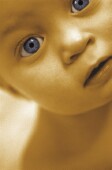- Could Your Grocery Store Meat Be Causing Recurring UTIs?
- Are You Making This Expensive Thermostat Error This Winter?
- Recognizing the Signs of Hypothyroidism
- 10 Strategies to Overcome Insomnia
- Could Artificial Sweeteners Be Aging the Brain Faster?
- Techniques for Soothing Your Nervous System
- Does the Water in Your House Smell Funny? Here’s Why
- Can a Daily Dose of Apple Cider Vinegar Actually Aid Weight Loss?
- 6 Health Beverages That Can Actually Spike Your Blood Sugar
- Treatment Options for Social Anxiety Disorder
Hearing Their Own Babble Helps Babies Learn to Speak: Study


Hearing themselves make speech-like sounds such as cooing and babbling is crucial to infants’ speech and language development, a new study shows.
The researchers also found that infants with major hearing loss who received cochlear implants to improve their hearing quickly reached the vocalization levels of infants with no hearing problems.
“Hearing is a critical aspect of infants’ motivation to make early sounds,” study author Mary Fagan, an assistant professor in the department of communication science and disorders at the University of Missouri, said in a university news release.
“This study shows babies are interested in speech-like sounds, and that they increase their babbling when they can hear,” she added.
The study included 27 hearing infants and 16 infants who had major hearing loss, but later received cochlear implants. Initially, the infants with hearing loss vocalized far less than those with no hearing problems. However, within four months of receiving their cochlear implants, the infants with hearing loss had the same levels of vocalization as those with normal hearing.
“These findings support the importance of early hearing screenings and early cochlear implantation,” Fagan said.
She and her colleagues also found that non-speech sounds such as crying and laughing were not affected by infants’ hearing ability.
“Babies learn so much through sound in the first year of their lives,” Fagan said. “We know learning from others is important to infants’ development, but hearing allows infants to explore their own vocalizations and learn through their own capacity to produce sounds.”
The study was published recently in the Journal of Experimental Child Psychology.
More information
The U.S. National Institute on Deafness and Other Communication Disorders has more about speech and language development.
Source: HealthDay
Copyright © 2026 HealthDay. All rights reserved.










